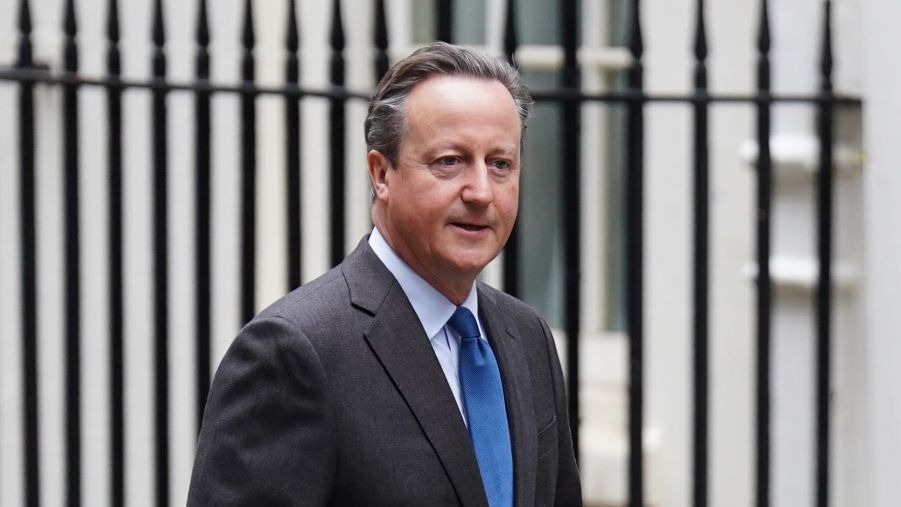Some time ago, one autumn afternoon, chatting with Felipe González, a few months after losing the general election and leaving the Government, I asked him whether a former president could come in as a minister in a new Executive like the one that had just happened in Italy. He answered me emphatically no, although without providing a convincing reason or motive. What happened in Italy could not have happened in Spain as in other countries. That would be like desecrating the sacred Chinese vase that exes belong to, according to one of the most oft-repeated expressions. Now that in the UK traditional rules have been broken, Prime Minister Rishi Sunak has just brought David Cameron, British Prime Minister from 2010 to 2012, into his government as Foreign Minister. and extreme positions.
Cameron’s appointment is part of a wider and ambitious strategy; At first glance, this seems like a simple chess move, but it was a clever move by Sunak to survive politically. Britain’s new diplomatic leader is still young. He is 57 years old and has entered history, but he is still active in politics. Man gradually becomes confused about the shape of his destiny; In the long run, a person is his circumstances, as our Ortega y Gasset has shown, in happy reflection.
Cameron, with his face as round as the full moon or yeast bread, provides solidity and security in providing balance in a turbulent and bloody international landscape. To join the government, according to British law as he is not a member of parliament, he must be appointed to the House of Lords. Simple procedure.
The change to the new name in Sunak’s government was carried out for reasons of electoral convenience and government effectiveness. Next year there will be a general election and the latest opinion polls give Labor a lead of between 15 and 20 points over the Conservatives. Most analysts attribute the fall of the Conservative Party to the Tory Party’s right-wing movement. Therefore, this reshuffle attempts to provide a parachute for the fall of the conservative government. To make room for the former “prime minister” abroad, Sunak dismissed the perceived radical right (ultra-right by the book) Suella Braverman as Home Secretary and moved current Foreign Secretary James Cleverly, 54, into that portfolio. With this move, the most radical and violent faces of the Executive were removed from government and the most powerful competitors were removed who would have challenged him for the position.
At this point we ask ourselves, who is Mrs. Braveman? He was a staunch opponent of emigration, although he was of emigrant descent, his father from Kenya and his mother from Mauritius. This legal profession, full of reactionaries, led the Conservative Party’s movement for Britain to leave the European Convention on Human Rights. He is an intellectual writer who has moored ships for refugees on the coast of the English Channel, but what tested the Prime Minister’s patience was an article he published in The Times newspaper, in which he accused Scotland Yar of double standards when controlling and repressing protesters who took to way to defend Palestinians or Israelis. He described pro-Palestinian activists as sowers of hatred, calling their demonstrations anti-Semitism and sympathizers of Islamic terrorism. These allegations greatly angered London’s Chief Constable, Mark Rowley, the Labor Party and most Conservative MPs, but no one else, of course. It is estimated that around 50 Conservative MPs will follow former minister Braverman if he decides to challenge Sunak as party leader. They said he was in it. An impulsive woman like her wouldn’t sit still.
The Conservative Party’s tendency towards the extreme right is nothing new, this was seen at the annual conference held in Manchester between 1 and 4 October. The conference was dominated by potential successors to Sunak, against a backdrop of far-right mutterings heard among party figures. The real stars of the meeting were: the former prime minister, Liss Truss, who was sacked because of her poor management, the very radical Braverman, who said that poverty and destitution were life choices and should not be opposed and Nigel Farage, the founder and very active leader of the right-wing party UKIP doubts the Tories are a truly conservative party. Far-right radicalism has made a lot of noise in London in recent weeks. Ultras from the fascist organization the English Defense League proliferate in riots across the Kingdom. There is fear. There is no doubt that with the entry of David Cameron into government and the departure of the bellicose Baverman, Sunak’s executive projected a more centrist image, although Cameron’s return to the forefront of active politics was greeted with a split in opinion. Labour’s foreign policy spokesman said: “David Cameron was a disastrous prime minister. “His appointment is the final act of desperation by a government that is devoid of ideas and talent.” The Daily Telegraph newspaper, a herald of Euroscepticism, wrote: “Cameron’s appointment is a return to the past.” Meanwhile, the most moderate groups hailed the country’s comeback, while former members of Boris Johnson’s government such as MP Andrea Jenkins wrote: “The only person who has the courage to tell the truth about the scandal-ridden state of the streets and society’s double standards. The politician is former Minister of Home Affairs Braverman. Her steadfastness in fighting emigration and deviant gender policies is the path to follow.”
The question that has arisen in the country’s political circles is whether Braverman dares to abandon his party and form an ultra-right wing. Most analysts do not rule out this challenge as happened in Spain with Vox. There has always been life after death in radical right-wing thought. The accordion has unexpected chords at both ends.

“Web specialist. Incurable twitteraholic. Explorer. Organizer. Internet nerd. Avid student.”






